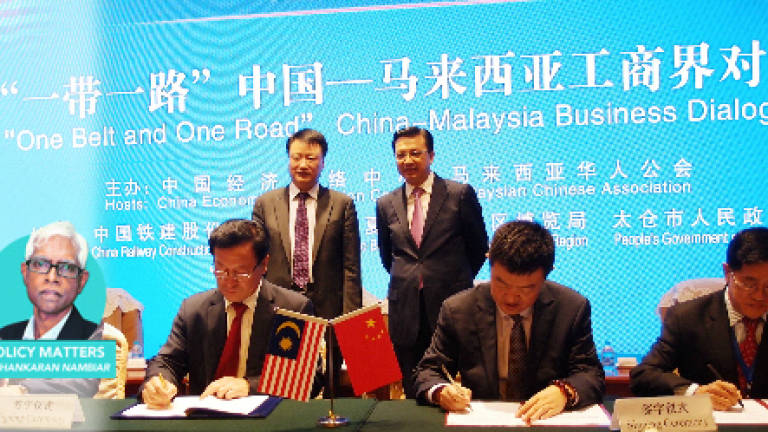Not all investments are alike

MALAYSIA has to come to terms with the political economy of investment from China. This is because there are various factors that are at play in evaluating the costs and benefits of China's investments.
Twenty years ago, China was hardly worthy of any mention. But China's growth and global ambitions have been rising.
China's accession into the World Trade Organisation can be treated as a watershed event. It has signalled more participation in the world economic system.
The move from being a "workshop for the world" to being a major economic player on the global stage has been rapid.
China has structured its own global financial infrastructure by establishing the Asian Infrastructure Investment Bank (AIIB). AIIB complements the "one belt, one road" (Obor) initiative. While AIIB is the financial side of China's success story, Obor is the physical counterpart.
Obor complements AIIB and so strengthens China's hand in extending a lending hand to developing countries.
There is a danger that Malaysia, fuelled by its own weakness, could be absorbed into China's orbit. What appears to be China's largesse in extending investment opportunities and helping to develop Malaysia's infrastructure could be a part of China's foreign aid diplomatic manoeuvre.
Foreign aid could collapse into debt, if one is not vigilant enough.
Colonialism has been known to follow trade, as India's experience with the East India Company documents.
The added element of complexity in the Malaysian case is that of being caught between two superpowers, one on the decline (the United States) and the other impatiently on the rise (China).
When Japanese or Swiss companies invest in Malaysia, it is just the companies that invest in Malaysia. These companies are interested in the profits that they can make. Their geopolitical interests are absent or limited.
The cost-benefit analysis that would have to be calculated for China's investments in Malaysia would go beyond the normal exercise that is usually conducted.
It is no longer merely a question of the returns to investment (though that would be important and cannot be excluded), or the cost of capital, the cost of environmental degradation and the riskiness of the projects.
It would be necessary to take into account the terms of financing, the cost of credit, the domestic employment that will be generated, the multiplier effects and the technology transfer that would be accomplished. None of these factors are out of the ordinary.
Equally important will be to assess the geopolitical impact of such investments. This is probably a factor that is difficult to measure. It is also a factor that we may not have had to measure in most other transnational investment projects previously.
One crucial point that we have to concede is that an investment from China is not a private sector investment in the same way as it is when a US or a Swiss company invests in Malaysia.
Remember, the Communist Party of China runs the country. State-owned enterprises from China cannot be treated as you would any company from a democracy. There are obvious differences.
When state-owned enterprises are involved, government involvement is deeper. The degree of engagement gets even deeper when the investments are about resources that have strategic and geopolitical value to the country in question.
This is particularly true with ports.
In the face of these multiple layers of involvement it would be extremely naïve to think that all investment is created equal and that more investment of such type is better than less investment.
China's investments in Malaysia open a whole new box of issues that we have not had to deal with in the past.
China's investments bring with them their own complexities. We have to deal with them honestly and maturely.
Dr Shankaran Nambiar is author of Malaysia in Troubled Times. The views expressed in this article are his own. Comments: letters@thesundaily.com